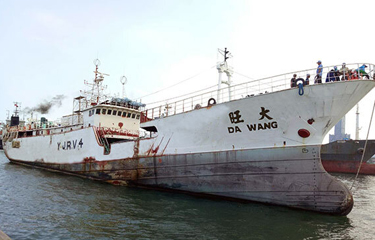US issues order against Chinese fishing company accused of forced labor

A Chinese spokesperson on Monday, 31 May, rejected American claims that a Chinese fishing company has committed forced labor violations, calling the claims “totally unfounded.”
The U.S. Department of Homeland Security announced on Friday, 28 May, that Customs and Border Protection officials had issued an order against the Dalian Ocean Fishing Company, Ltd. That order came after agency officials said they identified all 11 signs of forced labor during an investigation. Those signs included isolating workers, withholding wages, using intimidation, and retaining workers’ identification documents.
The order means that CBP agents will confiscate all seafood products brought into the U.S. by any boat in the Dalian Ocean Fishing Co. fleet.
However, Chinese Foreign Ministry spokesperson Wang Wenbin told reporters during a press conference that Dalian never has sold any products in the United States.
“There's nothing to detain in the first place,” Wenbin said.
The spokesperson added that Dalian officials investigated claims regarding an Indonesian crew on one of its ships, but said in their interviews, the workers said they have never been mistreated. Wenbin said American claims of forced labor in the Chinese fleet are just lies mean to harm Chinese businesses.
“China firmly opposes such political manipulation and calls on the U.S. side to respect the basic facts and annul the wrong decision,” Wenbin said. “China will take every measure necessary to firmly safeguard the legitimate rights and interests of Chinese enterprises.”
Federal law already prohibits imports of products derived from forced labor, but in recent months, U.S. officials have put more focus on stopping forced labor and other illegal practices in commercial fishing. Earlier in May, two U.S. lawmakers filed legislation that would extend the Seafood Import Monitoring Program to all species and add more data requirements for it to include labor violations.
Ned Price, a spokesperson for the U.S. State Department, said the country revoked more than a dozen visas from people accused of illegal, unreported, and unregulated fishing tied to human trafficking.
“These workers are forced to work 18 to 22 hours a day, often in illegal, unreported, and unregulated fishing,” Price said. “They are prevented from leaving their ships while facing hunger, restricted communication, inadequate medical care, degrading living and working conditions, physical abuse, and debt-based coercion.”
U.S. Homeland Security Secretary Alejandro Mayorkas said in a statement companies that mistreat workers should not be allowed to do business in America. Companies that rely on forced labor are able to sell their products at a lower cost, which put U.S.-based fishing operations at a disadvantage, he said.
“Products made from forced labor not only exploit workers, but hurt American businesses and expose consumers to unethical purchases,” he said. “This Withhold Release Order will ensure we continue to protect the human rights of those working in the distant-water fishing industry, while also upholding safeguarding our national and economic security.”
The International Labour Organization estimates that 25 million workers across all industries suffer from forced labor practices. The commercial fishing industry is especially susceptible since workers may spend months at sea.
Last year, China (and Taiwan) were listed by the U.S. Department of Labor in its annual report on commodities associated with forced labor. The 2020 edition of the List of Goods Produced by Child Labor or Forced Labor – a report required by the Trafficking Victims Protection Reauthorization Act of 2005 – claims the majority of workers on Chinese distant-water fishing vessels are migrants from Indonesia and the Philippines, and that they are frequently subject to abuse that sometimes rises to the level of human rights violations.
In December 2020, the U.S. Department of State revoked the travel visas of executives of Fuzhou, Fujian Province, China-based distant-water fishing firm Pingtan Marine, which is listed publicly on the NASDAQ Stock Exchange, alleging the company’s was involved in illegal, unreported, and unregulated (IUU) fishing.
Photo courtesy of Francisco Blaha






Share